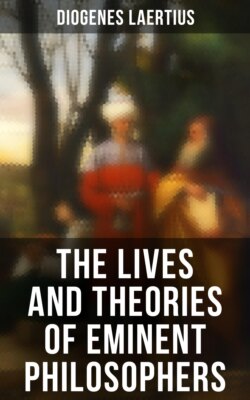Читать книгу The Lives and Theories of Eminent Philosophers - Diogenes Laertius - Страница 30
На сайте Литреса книга снята с продажи.
LIFE OF MYSON.
ОглавлениеTable of Contents
I. Myson, the son of Strymon, as Sosicrates states, quoting Hermippus as his authority, a Chenean by birth, of some Œtæan or Laconian village, is reckoned one of the seven wise men, and they say that his father was tyrant of his country. It is said by some writers that, when Anacharsis inquired if any one was wiser than he, the priestess at Delphi gave the answer which has been already quoted in the life of Thales in reference to Chilo:—
I say that Myson the Œtæan sage,
The citizen of Chen, is wiser far
In his deep mind than you.
And that he, having taken a great deal of trouble, came to the village, and found him in the summer season fitting a handle to a plough, and he addressed him, “O Myson, this is not now the season for the plough.” “Indeed,” said he, “it is a capital season for preparing one;” but others say, that the words of the oracle are the Etean sage, and they raise the question, what the word Etean means. So Parmenides says, that it is a borough of Laconia, of which Myson was a native; but Sosicrates, in his Successions says, that he was an Etean on his father’s side, and a Chenean by his mother’s. But Euthyphron, the son of Heraclides Ponticus, says that he was a Cretan, for that Etea was a city of Crete.
II. And Anaxilaus says that he was an Arcadian. Hipponax also mentions him, saying, “And Myson, whom Apollo stated to be the most prudent of all men.” But Aristoxenus, in his Miscellanies, says that his habits were not very different from those of Timon and Apemantus, for that he was a misanthrope. And that accordingly he was one day found in Lacedæmon laughing by himself in a solitary place, and when some one came up to him on a sudden and asked him why he laughed when he was by himself, he said, “For that very reason.” Aristoxenus also says that he was not thought much of, because he was not a native of any city, but only of a village, and that too one of no great note; and according to him, it is on account of this obscurity of his that some people attribute his sayings and doings to Pisistratus the tyrant, but he excepts Plato the philosopher, for he mentions Myson in his Protagoras, placing him among the wise men instead of Periander.
III. It used to be a common saying of his that men ought not to seek for things in words, but for words in things; for that things are not made on account of words, but that words are put together for the sake of things.
IV. He died when he had lived ninety-seven years.
